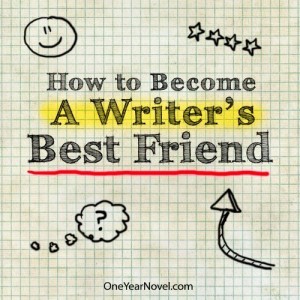How to Become a Writer’s Best Friend
Guest Post
Part 2 of a mini-series by veteran OYANer, Rachel Garner (aka Nairam or Nai), on novel critiques. Read Part 1 first »
In my previous post, I tackled the value of critique even when it hurts. Now I’m here with advice on how to create these worth-their-weight-in-gold critiques and how to minimize the necessary toe-smashing.
I am a huge advocate of not only asking for gold, but giving it. First, critiquing others’ work makes us better writers. No joke. Looking at writing from a critical angle, and giving advice to make it better gets good storytelling into our blood. Critiquing is an examination of what works.
Second, put simply, you will not fully appreciate what you have asked of people until you’ve done it yourself. You don’t realize how much work critiquing takes unless you do it; It’s a bit rude to ask people to do something you don’t fully understand or appreciate.
Third, giving is a Christlike behavior we should be practicing anyway. We’re in this ridiculous writing world together. Give the best gift you can give to other writers.
(Bonus reason: you might discover you actually enjoy it. I did.)
And now…
The Plunge
As OYANers, there is one preliminary step you should take to figure out how to critique: Read lessons 75 and 76 in the OYAN Compass. These lessons teach authors how to revise. The writer you’re critiquing should be trying to do this. You’re just providing some assistance.
Here are the two main things to start with:
- Emotion. This is key at any stage of a novel—draft 1 or draft 13. If the emotion is unconvincing, the book is sunk, no matter how good the prose is. Let the writer know what you’re feeling, even offering comments as simple as “I’m tense” or “this is boring.” You won’t always be able to tell if the emotion you’re picking up on is what the writer was going for, but if you bother to say “this is funny” in a section the author did not intend to be funny, you’ve succeeded, if unintentionally, in alerting them. Let them know how their story is affecting you.
- Believability. This relates to tons of things: plot, characters, setting, dialogue, and on and on. Is the author convincing you that this is a real place with real people where real things happen? If a character feels unreal, a turn in the plot too unlikely, or a line of dialogue stilted, say so. This is an area where your gut response can be very helpful.You can’t go wrong helping with emotion and believability. You can if you’re nitpicking prose. Don’t start your critiquing career reminding everyone that adverbs are a no-no. Story is king. Helping someone eliminate adverbs may make their prose sparkle, but if the characters are flat and the plot is a mess, you’ve gotten nowhere.
This brings us to…
The Gold
- Focus more on your reactions to character and situations—the big picture—than on issues like usage of semicolons and commas. It’s fine to correct these, but what screams gold is willingness to tackle the bigger picture—critique focused on how the story is working. It’s easy to find grammar Nazis. Story critiquers? Rare as gold itself.
- Don’t limit yourself to praise. Exclusive affirmation doesn’t count as critique. Writers love praise more than they admit, but it doesn’t improve the book. Writers who don’t want criticism haven’t awoken yet to the fact that they need it to grow.
- If the writer asks specific questions—ANSWER THEM! Over and over again, I see questions put forth by writers ignored by people critiquing their novels. There are few things more frustrating than asking for help on the tone of a scene and instead getting rants on semicolon use.“I don’t know how to answer the question,” you may say. Try anyway. If the writer asks: “Is the metaphorical symbolism of Annie’s dress apparent in the alliteration of the color descriptions?” It’s okay to say, “Not sure what you mean, but I did notice that there are a lot of long words I didn’t understand all starting with the letter ‘s’.”
Notice I’m acknowledging their question, even though I’m uncertain how to answer it. Address what they ask for first, then move on to what you have to offer.
Gold intact? Great! Now for…
The Pillow
- Praise what the author does well. Don’t spend so much time throwing gold at them you forget to point out when the author nailed something. Yes, it takes more work to point out the good as well as the bad, but it also takes a lot of work to write a novel. Give them some hope as they nurse their injured ego.Further, don’t praise generally. Praise specifically. Now and then, when appropriate, praise exuberantly. Don’t say: “Hey, I like this dude,” say, “”The way this guy reacted to his cousin’s death really intrigued me; I’d love to see more of him.” Even point out a particular sentence if it strikes your fancy. Authors secretly long for fangirls. If you can fangirl in honesty, do it.
- Follow up. Don’t dump a critique and flee for the nearest exit. Stick around to see if they have any questions about your critique or pleas for advice. You won’t necessarily know the answer to these questions, but being there to give input as they work through problems is really encouraging.
- Become a fan (see #1). If you like a book, follow its progress! When there aren’t new chapters to read and critique, remind them that you’re eager for more. Also, if you really like it…advertise it to others. Talk about a confidence boost for the author!
So, to sum up good critiquing: Gold plus pillow.
Balance your criticism and praise. Make the writer believe your praise by being brutally honest when they need it. Praise what is truly praiseworthy; criticize what needs help. Don’t lie about either the good or the bad.
Thus ends Nai’s “Ways to Become a Serious Writer’s Best Friend.”
Rachel was one of the seven students—or self-labeled “guinea pigs”—who took part in the OYAN pilot class. She placed third in both the 2008 and the 2012 OYAN novel contests. It would be hard to say who has stood to benefit more from her involvement, OYAN or Rachel! Known as “Nairam” in the extended OYAN community, Rachel is an example of dedication to her craft. She is also a kind and forthright writing mentor to students who are new to the student forum and program. A homeschool graduate, she is now a junior at The King’s College in New York City. She hopes to become a fiction editor or teach English history as a professor or curriculum writer. Also on the bucket list is to pursue publication of her 7-year-old writing project, a Robin Hood retelling, Forest of Lies. (As such, she’s soliciting and hoarding her own gold bricks!)





Thank you sooo much for explaining the critique stuff!
It was really helpful.